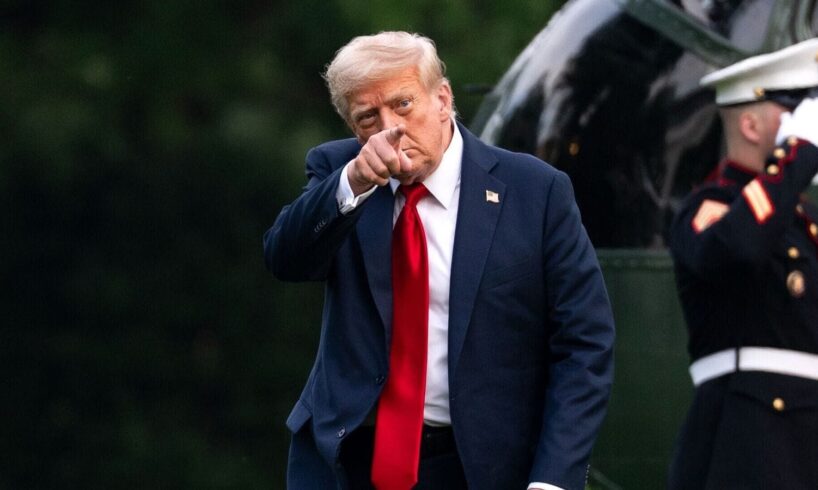
That is investors biggest worry about the U.S. president’s threat to slam 50% tariffs on imports from the Latin American giant.
“I’m most concerned that what just happened will help Lula a lot,” said Thierry Larose, portfolio manager for emerging markets local debt at Vontobel asset management, using the third-term Brazilian leader’s nickname. “That is why I’m cautious on the market.”
Equity investors apparently agree. The iShares Brazil exchange-traded fund has sold off 5% since Trump’s announcement last Wednesday.
Brazilian assets have been on a tear for most of this year. Stocks are up by nearly a quarter. The real has climbed 12% against the dollar, the best-preforming major currency outside Russia’s thinly traded ruble.
One reason is a low starting point, said Malcolm Dorson, head of emerging markets strategy at Global X ETFs: Stocks cratered by 35% in 2024.
Another is expectation that the 79-year-old Lula will be out of a job after elections in October 2026, with approval ratings stuck below 30%. “When Lula had brain surgery in December, the market rose 5% in an hour,” Dorson noted.
Trump’s announcement less than a week ago looks like political manna for the beleaguered leftist veteran.
Brazil has relatively little to fear economically from Washington’s wrath. Exports to the U.S. account for less than 2% of gross domestic product, compared with 30% for Mexico, Larose calculated. And the top exports—coffee, crude oil and iron ore—can be sold elsewhere.
Trump’s tariff letter mentioned trade only parenthetically. His principal demand was that Brazilian courts drop their prosecution—“witch hunt,” as he put it—of former President Jair Bolsonaro, who was indicted in February for conspiring to violently overturn the 2022 election. Bolsonaro lost to Lula by less than 2 percentage points.
Brazilian voters have high regard for their judiciary, said Duncan Wood, a senior adviser at the Inter-American Dialogue, a U.S.-based think tank for Western Hemispere issues.
“There’s traditionally been a high level of trust in Brazilian courts as apolitical,” Wood said.
That has enabled Lula to respond as defender of national sovereignty. Trump’s move was “a total lack of respect,” Lula told local journalists. “I have nothing to talk about with him.”
Lula 3.0 has, in fact, seen more impasse and muddle-through than leftist revolution, noted Sarah Glendon, senior sovereign analyst for Latin America at Columbia Threadneedle Investments.
A more conservative Congress has bottled up Lula’s signature populist initiative, eliminating income tax for anyone earning real 5,000 ($899) a month or less.
Many of Brazil’s fiscal challenges, like indexation of benefits and many wages, are embedded in the country’s constitution. That means any government will struggle to reduce debt payments, which eat up 30% of government revenue, or to keep inflation under control, Glendon asserted.
“It’s not necessarily the case that the fiscal position would be better without Lula,” she concluded.
On the other hand, with 95% of its debt issued in local currency, Brazilian credit is in no medium-term peril.
Still, investors are gaming out the complex political calculus of the next 15 months.
Brazilian elections turn more on charismatic personalities than parties, Dorson said. Lula, dominant on the left, is dangling a new run despite his age and health, with no clear successor if he steps aside.
Bolsonaro has been banned from running, even if he stays out of jail. But he remains “the puppet master” on the right, Dorson sais.
Markets are hoping Bolsonaro endorses Tarcisio de Freitas, a center-rightist who has earned high marks as governor of São Paulo state, Brazil’s largest.
“Freitas getting elected could release the mother of all rallies for Brazil,” Dorson predicted.
Bolsonaro might also name his son Eduardo, who has been lobbying Trump for him in the U.S., or wife Michelle as a stand-in.
To Wood, of the Inter-American Dialogue, what is clear is that Trump’s latest sallies have dimmed hopes of a U.S. reboot with Latin America, which were kindled by the appointment of Marco Rubio as secretary of state. Rubio is the son of Cuban immigrants and speaks Spanish.
Trump twinned his threat to Brazil with the promise of a 50% tariff on copper, which would strike at the economic lifeline of two more Southern neighbors, Chile and Peru. The president capped his week by setting a 30% tariff on Mexican imports as of Aug. 1.
“There was actually hope in the beginning of this administration,” Wood said.
Instead, leaders across the region are weighing other geopolitical options.
“It’s not like we can’t survive without the U.S.,” Lula told a Brazilian interviewer.
His political survival might even look better.
Write to editors@barrons.com





